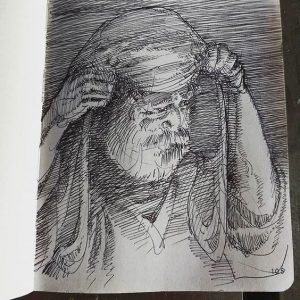 When Moses was called up to Mt. Sinai and spoke with God, beholding His glory, a well-noticed side effect happened. His face was super-charged with the glory of God’s light (Exodus 34). At first, Moses wasn’t even aware of the transformation (Exodus 34:29). But his brother Aaron and the people of Israel noticed it immediately. When they brought it to his attention, he continued to give the law that God had communicated to him, and afterwards he put on a veil to cover his face whenever he was in their presence.
When Moses was called up to Mt. Sinai and spoke with God, beholding His glory, a well-noticed side effect happened. His face was super-charged with the glory of God’s light (Exodus 34). At first, Moses wasn’t even aware of the transformation (Exodus 34:29). But his brother Aaron and the people of Israel noticed it immediately. When they brought it to his attention, he continued to give the law that God had communicated to him, and afterwards he put on a veil to cover his face whenever he was in their presence.
This process would repeat itself whenever Moses spent time in God’s presence. He would remove the veil while in the presence of God, be supercharged by God’s glorious presence again, return to give the law to the people with shining face, and then cover his face with a veil until he met with the Lord again.
Why Did Moses Cover or Veil His Face?
When the people first saw Moses lit up by the presence of God, they were “afraid to come near him” (Exodus 34:30). Because of that, it would be easy to assume that Moses was putting a veil over his face because he didn’t want the people to be overwhelmed by God’s light. But thoughtful consideration of that possibility reveals a logical problem. If that were the case, wouldn’t he have covered his face while giving the law to the people? He didn’t (Exodus 34:32-33). Could this indicate that Moses’ reason for putting a veil over his face wasn’t motivated by the glory overwhelming the people, but by whatever took place after he was finished delivering revelation from God?
Paul reveals to us the reason Moses operated the way he did with God’s glory:
“Therefore, since we have such hope, we use great boldness of speech – 13unlike Moses, who put a veil over his face so that the children of Israel could not look steadily at the end of what was passing away.” —2 Corinthians 3:12-13
Moses had a “modesty cloth” to hide the fading of God’s glory. One might ask, why would he do that? Was it to protect the Lord’s name? Not likely, as the fear of God would have been on all who saw Mt. Sinai and experienced the judgment after the sin of the golden calf (Exodus 32).
What Moses more likely was wanting to conceal was the fact that the glory that was on Him was fading, an indication of his inability to retain what God had imparted to him. Moses didn’t want the people to notice that the glory apparent in his life couldn’t be sustained by him. Like everyone else, he was ordinary.
We All Want To Hide Fading Glory
In our fallen human nature, we all are unable to measure up to God and be keepers and sustainers of God’s glory (Romans 3:23-24). But thankfully, this isn’t where Paul ends the story. He tells us that because of Jesus the glory that we can experience is different than the glory Moses experienced. Paul writes:
“But we all, with unveiled face, beholding as in a mirror the glory of the Lord, are being transformed into the same image from glory to glory, just as by the Spirit of the Lord.” —2 Corinthians 3:18
The incredible news Paul shares is that because of Jesus, ordinary people like me and you who trust what Jesus has accomplished for us are being transformed by the Holy Spirit into His image, “from glory to glory.” And, on top of that, we have the privilege of communicating the glory of the Gospel and God’s kingdom that will never fade away!
We Are Being Transformed from “Glory to Glory”!
If you enjoy learning about and studying passages like this, check out ISOW’s courses on the Book of Exodus and our soon to be released course on the Book of 2 Corinthians in our Books of the Bible division.
Matthew Foley
Staff Writer, Instructor, ISOW Bible College
To view courses in Spanish, click here.


